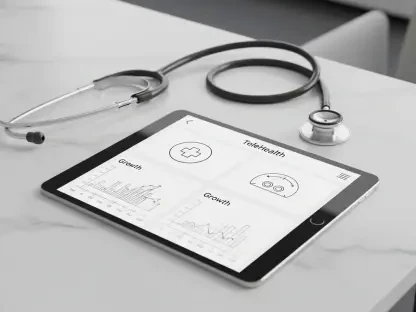Setting the Stage for AI in Cancer Care
In the complex landscape of oncology, where precision and timely decisions can mean the difference between life and death, a staggering statistic emerges: over 10 million cancer diagnoses are made globally each year, placing immense pressure on healthcare systems to innovate. The integration of artificial intelligence, particularly Large Language Models (LLMs), offers a promising avenue to address this burden by enhancing patient care, streamlining clinical workflows, and optimizing data management. These advanced tools, capable of processing and generating human-like text, are stepping into the spotlight as potential game-changers in the fight against cancer.
The current state of the oncology industry reveals a growing reliance on digital solutions to tackle challenges like resource constraints and disparities in care access. As healthcare institutions grapple with an ever-increasing volume of data, from patient records to clinical trial results, the need for efficient, scalable technologies becomes undeniable. LLMs stand poised to support this transformation, provided their adoption is guided by robust frameworks that prioritize safety and ethical considerations.
This industry report delves into the pivotal role of LLMs in reshaping oncology, spotlighting the groundbreaking guidance from the European Society for Medical Oncology (ESMO). By exploring structured applications, emerging trends, and critical challenges, the report aims to illuminate how these AI tools can drive progress while maintaining trust and accountability in cancer care.
Understanding the Role of LLMs in Oncology
The field of oncology stands at a crossroads, with technological advancements like LLMs offering unprecedented opportunities to enhance patient outcomes. These models, built on vast datasets, can interpret complex medical information, assist in drafting patient education materials, and even support clinicians in synthesizing research for treatment planning. Their ability to process language at scale makes them invaluable in a domain where information overload often hinders efficiency.
Beyond individual applications, LLMs hold the potential to revolutionize institutional workflows by integrating with electronic health records and facilitating tasks such as trial matching or population health analysis. ESMO, a leading authority in cancer care, recognizes this transformative power and advocates for the responsible use of such technologies. Their involvement underscores a broader industry shift toward embracing AI as a supportive tool rather than a standalone solution.
However, the integration of LLMs must be underpinned by stringent ethical standards and safety protocols. The risk of errors or biases in AI outputs necessitates a cautious approach, ensuring that patient trust and clinical integrity remain paramount. As the industry navigates this terrain, the balance between innovation and responsibility becomes a defining factor in realizing the full potential of these tools.
ESMO’s Groundbreaking ELCAP Framework
Key Features and Three-Tier Structure
ESMO has introduced a pioneering framework known as the ESMO Guidance on the Use of Large Language Models in Clinical Practice (ELCAP), designed to standardize AI adoption in oncology. This framework operates on a three-tier structure, categorizing LLM applications into patient-facing, clinician-facing, and institutional systems. Each tier addresses specific user needs and associated risks, ensuring that AI tools are deployed in context-specific ways that maximize benefit while minimizing harm.
Patient-facing applications, such as chatbots for symptom guidance, focus on accessibility but require supervised pathways to prevent misinformation. Clinician-facing tools aim to support decision-making through data synthesis, yet demand transparency to maintain accountability. Institutional systems, often embedded in backend operations, prioritize data privacy and rigorous testing to enhance efficiency in areas like clinical trial coordination. This structured approach also opens doors to personalized care and improved equity by tailoring solutions to diverse healthcare settings.
A critical aspect of ELCAP is its emphasis on the assistive nature of LLMs, ensuring they operate under human oversight rather than as autonomous entities. This cautious stance reflects an industry-wide recognition that while AI can streamline processes, it must not supplant the nuanced judgment of healthcare professionals. Emerging trends, such as context-aware AI customization, further highlight the framework’s forward-thinking design in fostering trust and utility.
Impact and Future Projections
The anticipated impact of ELCAP on oncology is profound, with expectations of enhanced clinical workflows through better documentation and decision support. By providing clear guidelines, the framework aims to improve patient outcomes by ensuring that AI tools deliver reliable, relevant insights. Early indicators suggest that structured LLM use can reduce administrative burdens, allowing clinicians more time for direct patient interaction.
Looking ahead, projections from ESMO’s consensus statements point to significant growth in AI-driven healthcare solutions over the next few years, from 2025 to 2027. Institutional systems, for instance, are expected to see advancements in data management capabilities, enabling faster identification of suitable clinical trial candidates. Performance metrics also indicate potential for cost savings and scalability as these tools become more integrated into routine operations.
The long-term vision includes a landscape where LLMs contribute to equitable cancer care by bridging gaps in resource-limited settings. As adoption scales, the framework’s focus on continuous evaluation ensures that benefits are sustained without compromising safety. This strategic outlook positions ELCAP as a cornerstone for responsible innovation in the industry.
Challenges in Implementing LLMs in Oncology
Integrating LLMs into oncology is not without hurdles, as the technology faces significant risks across its application spectrum. In patient-facing tools, the danger of misinformation looms large if outputs are not carefully vetted, potentially leading to harmful self-management decisions. Clinician-facing systems grapple with validation challenges, where untested models could skew treatment recommendations if data inputs are incomplete or biased.
Institutional applications encounter their own set of issues, particularly around data privacy and security. The vast amounts of sensitive information processed by these systems make them prime targets for breaches, necessitating robust safeguards. Additionally, technological barriers such as ensuring high-quality input data and market-driven concerns like cost and accessibility further complicate widespread deployment in diverse healthcare environments.
Addressing these obstacles requires a multifaceted approach, including the establishment of supervised implementation pathways to catch errors early. Transparency measures, such as clear disclosure of AI limitations to users, alongside continuous monitoring protocols, can mitigate risks effectively. Collaborative efforts between technology developers and healthcare providers will also be essential to balance innovation with practical, affordable solutions.
Regulatory and Ethical Considerations for LLMs in Cancer Care
The regulatory landscape for AI in healthcare remains a critical focus, with ESMO advocating for stringent standards to ensure safety and transparency in LLM use. Compliance with data protection laws is non-negotiable, especially as these models handle sensitive patient information across various applications. Regulatory bodies are increasingly emphasizing the need for clear accountability mechanisms to prevent misuse or unintended consequences.
Institutional governance plays a pivotal role in this context, requiring privacy-by-design principles to be embedded in system architectures from the outset. Re-validation protocols are also highlighted as vital whenever underlying data or processes evolve, ensuring that LLM performance remains consistent with clinical standards. Such measures aim to build a foundation of reliability that stakeholders can depend on.
Ethically, the imperative of human oversight cannot be overstated, as ELCAP’s consensus statements reinforce the importance of preserving trust in clinical judgment. Balancing technological advancement with moral responsibility ensures that patients and providers alike view AI as a supportive ally rather than a disruptive force. This ethical grounding is crucial for fostering long-term acceptance and efficacy in cancer care settings.
The Future of LLMs in Oncology with ESMO’s Vision
Looking toward the horizon, the trajectory of LLMs in oncology suggests a blend of opportunity and caution as emerging autonomous or agentic AI models gain attention. While these advanced systems could potentially act independently, their associated safety and ethical challenges necessitate careful scrutiny and dedicated guidelines. ESMO’s vision remains rooted in ensuring that such innovations align with patient-centric priorities.
Disruptive possibilities, such as deeper integration with electronic health records and enhanced symptom support tools, are poised to reshape how care is delivered. Evolving expectations from both patients and clinicians point to a demand for intuitive, accessible AI solutions that seamlessly fit into daily workflows. Growth areas like real-time data analytics also signal a shift toward proactive rather than reactive cancer management strategies.
Influencing factors, including rapid technological progress and adapting regulatory frameworks, will continue to shape LLM applications in the global healthcare arena. As priorities shift to address disparities in care access, the industry must remain agile, leveraging ESMO’s guidance to navigate complexities. This dynamic interplay of innovation and oversight promises a future where AI amplifies the reach and impact of oncology services.
Reflecting on Progress and Next Steps
Reflecting on the insights gathered, the exploration of LLMs in oncology under ESMO’s guidance reveals a transformative yet challenging path that demands careful navigation. The ELCAP framework stands as a beacon, offering structured solutions that balance technological promise with clinical responsibility. Each tier of application, from patient support to institutional efficiency, highlights unique contributions and risks that shape the industry’s approach.
Moving forward, stakeholders are encouraged to prioritize actionable strategies such as investing in robust validation processes and fostering interdisciplinary collaboration to refine AI tools. Emphasizing human oversight remains a critical step, ensuring that trust is never compromised in the rush toward innovation. Additionally, advocating for global standards could address disparities, making advanced care tools accessible across varied healthcare landscapes.
The journey also underscores the importance of anticipating regulatory shifts and preparing for the ethical dilemmas posed by autonomous AI systems. By focusing on scalable, context-specific implementations, the oncology community can harness LLMs to not only enhance outcomes but also redefine equity in cancer care. This forward-thinking mindset paves the way for a resilient, inclusive future in the fight against cancer.









